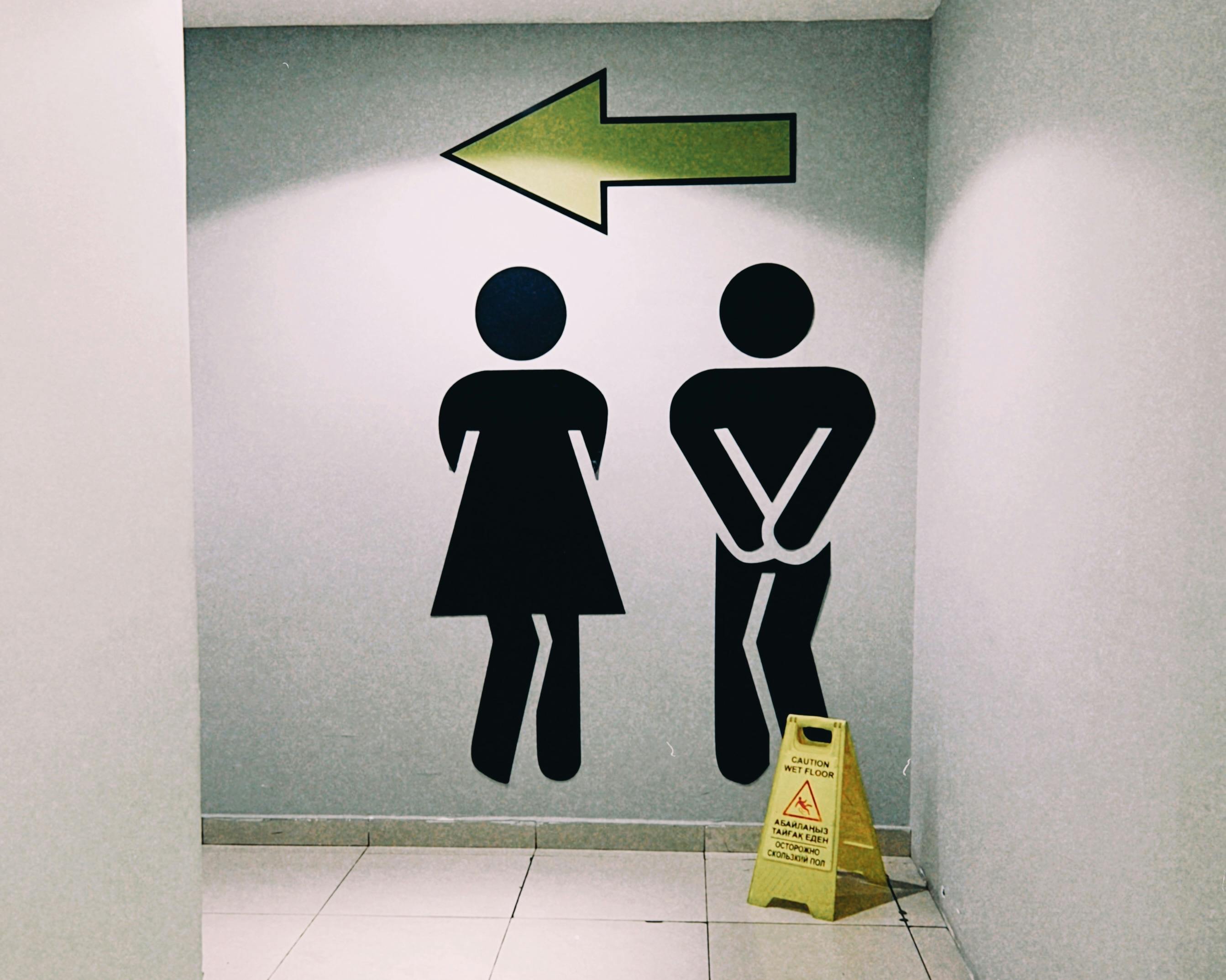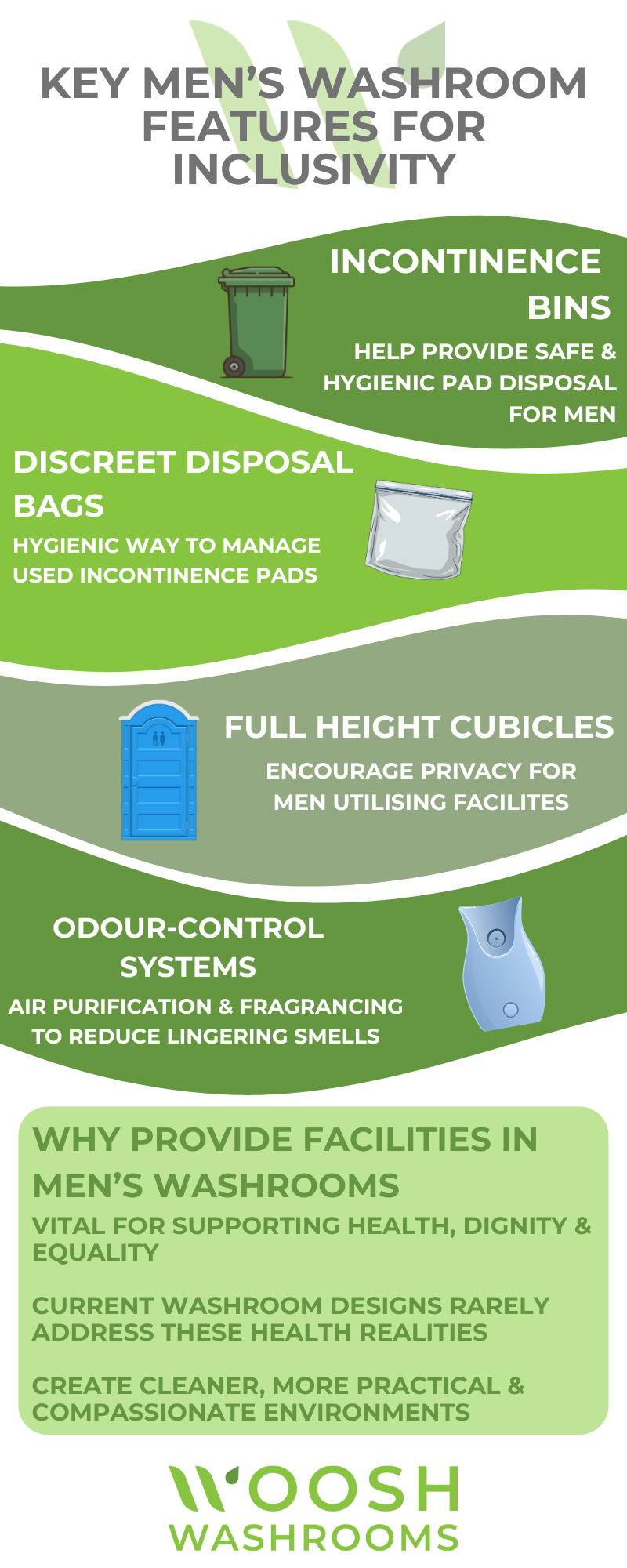Why Men's Washroom Facilities Matter

Men’s washrooms are often overlooked when it comes to supporting real health needs. Across the UK, many men experience urinary incontinence, often linked to prostate cancer, yet most facilities lack suitable disposal options like incontinence bins.
This article explores why men’s washroom facilities matter, the importance of proper disposal of incontinence pads, and how better design can restore dignity and hygiene for all users.
Keep reading to discover how small changes can make a big difference.
- The Hidden Issue: Male Urinary Incontinence
- The Challenge for Men in Public Spaces
- Why Incontinence Bins Are Essential
- How to Design Better Men’s Washrooms
- Why Men’s Health Should Be a Priority in Public Facility Planning
- Setting New Standards: How Businesses Can Lead Change
- Key Takeaways for Men’s Washroom Facilities
The Hidden Issue: Male Urinary Incontinence
Urinary incontinence is a health concern that affects roughly 1 in 3 men aged over 65 in the UK, leaving them with some form of bladder leakage. Studies also suggest that up to 51% of men experience symptoms of urinary incontinence at some point in their lives. Despite these statistics, the condition remains one of the least discussed issues in men’s health.
[Read more on Male Incontinence]
The Link Between Incontinence and Prostate Cancer
One of the most common reasons for male incontinence is prostate cancer, the most frequently diagnosed form of cancer among men in the UK. Around 1 in 8 men are diagnosed with prostate cancer in their lifetime; treatments such as prostate surgery and radiotherapy can weaken bladder control muscles, leading to temporary and sometimes long-term incontinence.
Research has shown that 60-70% of men experience urinary incontinence shortly after a radical prostatectomy with symptoms lasting for months or even years afterwards.
The Numbers Behind the Problem
With millions of men coping with these symptoms every day, the need for dignity and practical support is crucial. Products such as male urinary incontinence pads play a vital role in supporting men to maintain their usual routines. Without proper disposal options like incontinence bins in men’s washrooms, many struggle to manage discreetly.
The Challenge for Men in Public Spaces
Something as simple as using a public washroom can be a source of stress for many men managing incontinence. Despite the fact that millions of men across the UK struggle with incontinence, most men’s bathrooms still lack suitable disposal options for incontinence pads.
Without access to these facilities, men are often forced to resort to less sanitary options such as taking used pads away with them or disposing of them in general waste bins outside of the cubicle. This creates further hygiene issues and undermines men’s dignity and confidence when managing their condition discreetly.

Why Incontinence Bins Are Essential
Installing incontinence bins in men’s washrooms is a simple and effective way to improve hygiene, dignity and equality in public facilities.
These bins provide a safe, discreet and hygienic way for men to dispose of used incontinence pads without feeling embarrassed or inconvenienced.
Unlike general waste bins, these are specifically designed to manage absorbent hygiene products, preventing odours and ensuring waste is handled according to sanitary standards.
An incontinence bin in each cubicle promotes inclusive design and equal access for all men. This means men living with incontinence, whether due to prostate cancer treatment, aging or other medical conditions, don’t have to resort to unsanitary solutions.
How to Design Better Men’s Washrooms
Modern men’s washrooms design should be about functionality, inclusivity, hygiene and dignity. These facilities should recognise and accommodate the needs of men managing incontinence without inconvenience.
With thoughtful design and appropriate hygiene solutions, businesses can create washrooms that are welcoming, discreet and accessible for all users.
Key Design Features to Include
To make men’s washrooms more inclusive and supportive, you should consider incorporating:
- Incontinence bins - allowing discreet disposal of male urinary incontinence pads.
- Discreet disposal bags - providing a hygienic, odour-free way for men to manage used pads.
- Full height cubicle doors and partitions - ensuring privacy and comfort when changing or disposing of products.
- Touch-free fixtures - automatic soap dispensers, flush systems and men’s bins to reduce contamination.
- Odour-control systems - air purification and fragrancing to reduce lingering smells and maintain cleanliness.
Why Men’s Health Should Be a Priority in Public Facility Planning
Public washrooms are an essential part of how we support health, dignity, and equality in everyday life. Men’s health has often been overlooked in this area, even though conditions such as urinary incontinence are common, particularly after prostate cancer treatment or with age. Yet the design of men’s facilities rarely reflects these realities.
Equal consideration in washroom planning sends the message that men’s health matters too. When public spaces and workplaces provide facilities that recognise these needs, they create environments that are not only cleaner and more practical but also more compassionate and inclusive.
[Contact us about Male Incontinence Bins]
Setting New Standards: How Businesses Can Lead Change
Workplaces, shopping centres and hospitality venues are in a unique position to drive real change in how men’s health is supported in public spaces. Updating washrooms to include facilities like disposal for incontinence pads not only promotes compliance and hygiene, but shows respect, equality and awareness for men that are struggling.
Businesses can take this as an opportunity to set an example for others and help create more inclusive bathroom environments across the UK.
Practical Steps Businesses Can Take
- Audit existing facilities - Review current washroom layouts and facilities, and identify where men’s cubicles lack discreet disposal options for incontinence pads.
- Install incontinence bins in every cubicle - Ensure safe, hygienic and discreet disposal to meet modern hygiene and equality expectations.
- Partner with professional hygiene providers - Woosh offers incontinence waste bins, servicing and odour controlled solutions for male washrooms.
- Train cleaning & facilities teams - raise awareness of why these facilities matter and how to properly maintain them.
- Promote awareness internally & externally - use staff communications and signage to normalise conversations around men’s health and show visible support.
- Update washroom design & refurbishment plans - include incontinence facilities in every new project & renovations moving forward.
- Engage with industry standards - follow initiatives like BOG STANDARD and Stalls for All, which advocate equal access to incontinence disposal in men’s toilets.
[Contact us about Male Incontinence Bins]
Key Takeaways for Men’s Washroom Facilities
- Male urinary incontinence is more common than many realise - up to half of UK men experience symptoms, often linked to ageing or prostate cancer treatment.
- The link between incontinence and prostate cancer is significant - treatments such as surgery or radiotherapy can temporarily or permanently affect bladder control.
- Men face real challenges in public spaces - the lack of proper disposal options for incontinence pads causes embarrassment, anxiety, and hygiene issues.
- Incontinence bins are essential - they offer safe, discreet, and hygienic disposal for male urinary incontinence pads, helping restore dignity and comfort.
- Better washroom design supports inclusivity - thoughtful design with incontinence bins, privacy features, and odour control systems makes facilities more user-friendly.
- Men’s health deserves equal consideration in facility planning - public and workplace washrooms should reflect the same level of care given to women’s hygiene needs.
- Businesses can lead positive change - workplaces, shopping centres, and hospitality venues can set new standards by upgrading facilities and raising awareness.
- Practical steps make a difference - auditing washrooms, training staff, and partnering with hygiene providers like Woosh Washrooms can transform user experience.
- Normalising men’s health discussions matters - open communication and visible action help remove stigma and promote dignity for all users.
FAQs
Why are there sanitary bins in men’s toilets?
Sanitary bins in men’s toilets are becoming more common for male urinary incontinence and the need for discreet disposal options. These bins are designed for used male incontinence pads and other absorbent hygiene products, offering the same dignity and hygiene standards provided in women’s washrooms.
Does prostate cancer cause incontinence?
Prostate cancer itself doesn’t directly cause incontinence, but treatments such as surgery or radiotherapy can temporarily weaken the bladder or pelvic floor muscles, leading to leakage. For many men, this improves over time with recovery and exercise, but some experience ongoing symptoms that require male incontinence pads or other support.
What is the BOG STANDARD scheme?
BOG STANDARD is a UK initiative launched by phs Group in partnership with Prostate Cancer UK. It aims to make incontinence bins a standard feature in every men’s toilet across the UK. The scheme provides guidance and resources for businesses to create more inclusive washrooms that meet men’s hygiene and health needs with the same care shown in women’s facilities.
What do men wear for incontinence?
Men typically use urinary incontinence pads or guards, which are shaped to fit discreetly in underwear and manage light to moderate leakage. For heavier incontinence, there are pull-up pants or absorbent briefs designed for comfort and discretion.
Equip Your Washrooms with Facilities for Men
Supporting men’s health begins with recognising their real, everyday needs and providing washrooms that accommodate them. From adding incontinence bins to improving privacy, hygiene and accessibility, small upgrades can make a big difference to men’s dignity, confidence and equality.
At Woosh Washrooms, we help businesses across the UK create inclusive, hygienic, and compliant facilities that support everyone who uses them. Whether you manage offices, retail spaces, or hospitality venues, we provide expert guidance and tailored hygiene solutions to help you meet modern standards with ease.
Related Articles
- Your Guide to Eliminating Viruses with Air Purifiers
- Clean Facilities: How to Avoid HSE Fines
- Fact or Myth: Unveiling the Truth About Hygiene
